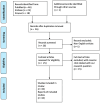Spontaneous Coronary Artery Dissection in Patients with Autosomal Dominant Polycystic Kidney Disease: A Systematic Review of the Literature
- PMID: 39063956
- PMCID: PMC11278354
- DOI: 10.3390/jpm14070702
Spontaneous Coronary Artery Dissection in Patients with Autosomal Dominant Polycystic Kidney Disease: A Systematic Review of the Literature
Abstract
Spontaneous coronary artery dissection (SCAD) is a spontaneous intimal tear of the coronary artery wall. A factor rarely associated with SCAD is autosomal dominant polycystic kidney disease (ADPKD). Using the PRISMA guidelines, we identified 10 unique cases of SCAD in ADPKD patients reported between 1998 and 2021. Ages ranged from 36 to 59 years, with an average of 44.6 years. The majority of patients were female (80%). Each case was diagnosed with a cardiovascular event: ST-elevation myocardial infarction (STEMI) in 40%, non-ST elevation myocardial infarction (NSTEMI) in 50%, and stable angina in 10%. Conservative management was used in 60% of cases. There is a significant gap in our understanding of the relationship between SCAD and ADPKD. Polycystin complex can lead to structural abnormalities in blood vessels, resulting in vascular leaks and vessel rupture. This suggests that ADPKD patients may have an elevated risk of arteriopathies, including coronary artery dissection.
Keywords: ADPKD; SCAD; polycystin; vascular integrity.
Conflict of interest statement
The authors declare no conflicts of interest.
Figures




References
-
- Hayes S.N., Kim E.S.H., Saw J., Adlam D., Arslanian-Engoren C., Economy K.E., Ganesh S.K., Gulati R., Lindsay M.E., Mieres J.H., et al. Spontaneous Coronary Artery Dissection: Current State of the Science: A Scientific Statement from the American Heart Association. Circulation. 2018;137:e523–e557. doi: 10.1161/CIR.0000000000000564. - DOI - PMC - PubMed
Publication types
LinkOut - more resources
Full Text Sources
Miscellaneous

